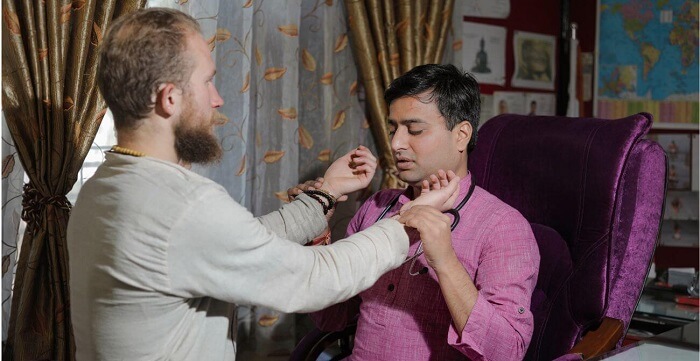
Path to Ayurvedic Knowledge | Our Ayurveda Courses In Rishikesh, India

Maa Yoga Ashram offers 2-week and 4-week beginner and advanced Ayurveda courses in India. Maa Yoga Ashram, an Ayurvedic Treatment and Research Centre in Rishikesh, serves as an ideal place to take your Ayurveda Course in Rishikesh. So, if you wish to deepen your knowledge of the ancient medication system, this course is for you!
We have a vast team of Ayurveda specialists, including Yogi Dr Amrit Raj, a fourth-generation Ayurvedic doctor and founder of Maa Yoga Ashram, Dr Rakesh Agarwal, Dr Neelam Agarwal, and Dr Arjun Raj, each one having great experience in their expertise field, bringing a unique outlook to the course.
We aim to offer one-on-one attention from our experts. The course begins with a personal consultation with Dr Amrit Raj, followed by a basic Panchakarma treatment to help you cleanse the body's toxins. We incorporate Ayurvedic treatments and yoga practices in our Ayurveda Course in Rishikesh to improve your knowledge and physical wellness.
Our Ayurveda Course In Rishikesh - Quick Overview


| Course Name | Ayurveda Courses in Rishikesh |
|---|---|
| Level | Beginner to Intermediate |
| Yoga Style | Hatha Yoga |
| Duration | 2 Week & 4 Weeks |
| Language of Instruction | English |
| Module | Residential with Meals |
| Certification | Ayurveda Course Certificate |
| Location | Rishikesh |
Our Ayurveda Course / ayurveda training india focuses on teaching the foundational principles of Ayurveda, which can be brought into one's lifestyle to achieve optimal health and vitality. In this course, participants will learn about the concepts of nourishment, balance, and vitality, which will help them better understand their own bodies.
Curriculum Of Our Ayurveda Course In Rishikesh

Ayurveda follows a preventive care approach. Hence, it is free from harmful side effects and is capable of treating the disease at its source. We believe in the healing properties of Ayurveda. Our Ayurveda course in India is a program that will provide you with a thorough understanding of this field.
Yogi Dr Amrit Raj, our Ayurveda specialist, will guide and adjust the course to make it suitable for students at all levels.
In this course, you will learn about Ayurvedic philosophy and the fundamental concepts of Ayurveda, such as:
- Understanding Prakriti, or the personality of an individual
- Understanding Doshas: Vata, Pitta, and Kapha
- The effect of diet and lifestyle on Prakriti
- Prevention of illness through Ayurvedic lifestyle
- The role of nature in human health
During this course, you will learn about nutrition, food, and herbs and use this knowledge to make balanced meal plans based on Ayurvedic principles.
- Understanding the importance of Ayurvedic food for healthy living
- Creating balanced meal plans using natural herbs and spices
- Learning the six tastes and how to use them to cook delicious and healthy meals
- Cooking Ayurvedic food
Within this section, you will learn:
- About natural herbs and spices and their use in treatments
- Natural remedies and techniques for the treatment of various diseases
- Use of specific herbs to balance doshas
- Practicing Ayurvedic therapies for treatment
Our Ayurvedic course also involves Panchakarma, a detoxification program for the mind, body, and soul. It strengthens the immune system and restores balance and well-being by cleansing the body and balancing the Doshas.
It involves:
- Understanding the importance of Panchakarma on well-being
- Performing the five actions, i.e., Vamana, Virechana, Basti, Nasya, and Raktamokshana
Daily Schedule Of Our Ayurveda Course In Rishikesh


We have a thorough daily schedule in our Ayurveda course in India. We offer a holistic program suitable for beginners and advanced students. It involves Yoga practices, outdoor trips, Ayurvedic cooking classes, and Ayurvedic consultations, along with theoretical studies, to make it a wholesome learning experience.
| Time | Activity |
|---|---|
| 05:30 AM to 07:00 AM | Yoga (Hatha, Ashtanga, Vinyasa) |
| 07:00 AM | Fire Ceremony |
| 07:30AM (Monday, Wednesday, Friday) | Ganga Walk |
| 08:30 AM | Ayurvedic Breakfast (Prasadam) |
| 9:00 AM to 10:00 AM | Mantra chanting |
| 10:30 AM | Ayurvedic consultation & Treatments |
| 11:30 AM to 1:30 PM | Ayurveda Theory Class |
| 1:30 PM | Ayurvedic Lunch ( Prasadam) |
| 03:00 PM to 04:00 PM | Ayurvedic Cooking Class |
| 05:00 PM to 06:30 PM | Yoga ( Hatha, Ashtanga, Vinyasa) |
| 6:30 PM | Ganesh Arti |
| 7:30 PM | Ayurvedic Dinner (Prasadam) |
| 10:00 PM | Lights out |
Note: Daily schedule is subject to change at the teacher's discretion.
Is Our Ayurveda Course In Rishikesh For You?

To join our Ayurveda course in Rishikesh, make sure you meet these requirements:
- You can understand and speak basic English as the lessons are taught in English
- You are 18 years and above
- You are physically and mentally healthy
- You are eager to study the Ayurvedic medicine system
- You are passionate about treating others through Ayurveda
Get ready to heal others through your Ayurvedic wisdom!
For more information about our best Ayurveda courses in India, kindly contact us on WhatsApp at
Fees And Duration Of Our Ayurveda Course In Rishikesh

Fees And Duration Of Our Ayurveda Course In Rishikesh
The beginner course spans 2 weeks and is provided in two different durations. One batch begins on the 2nd and ends on the 15th of each month. The other batch starts on the 16th and ends on the 29th of each month. The total fee for our Beginner Ayurveda course is ₹ 75,000 INR.
The duration of the advanced Ayurveda course is 4 weeks, beginning on the 2nd and finishing on the 29th of each month. The total fee for our Advanced Ayurveda course is ₹ 1,50,000 INR.
For more details and questions about enrolling in this course, Contact us on +91-8449333303
We have only limited seats for our Ayurveda course in Rishikesh, so secure your place fast!
What is included in our Ayurveda Course Fees?
- Comfortable accommodations during the stay
- Ayurvedic consultations and treatments
- Yoga equipment for practical classes (yoga mats, blocks, straps, etc.)
- Course materials (Notebooks, Cleansing kit)
- Delicious Ayurvedic meals with herbal tea daily
- Weekend outings to local attractions
- Sightseeing: Ganga beach walks and evening Ganga Arti
- Access to books on Ayurvedic sciences
- Ayurveda course certificate
What is not included in our Ayurveda Course Fees?
- Airflight, visa, and travel charges
- Personal expenses
- Insurance and any other liabilities
- Private trips besides those organized by our school
- Extended stay after the completion of the course (available at additional charges)
Why Choose Maa Yoga Ashram For Your Ayurveda Course In Rishikesh?


Are you fascinated by the science of Ayurveda and its natural healing powers? Do you wish to become an Ayurvedic doctor and heal others through natural remedies? Our Ayurveda course in Rishikesh can help you achieve your dream!
Maa Yoga Ashram offers beginner and advanced Ayurveda courses India. This course is designed to give a detailed knowledge of the Ayurvedic medicine system and how to apply the knowledge to treat others. Our team of expert Ayurvedic doctors will guide you in your Ayurveda learning journey. Their vast experience will help you uncover the powers of Ayurveda and use them to deliver relief to the suffering people.
Our Ayurveda Course India provides various benefits for your physical health and emotional well-being. By focusing on your body, mind, and spirit, you can access your inner wisdom and promote your healing process.
Get on a noble journey. Learn as you heal yourself along the journey of Ayurveda and become a great Ayurvedic doctor everyone can rely on!


